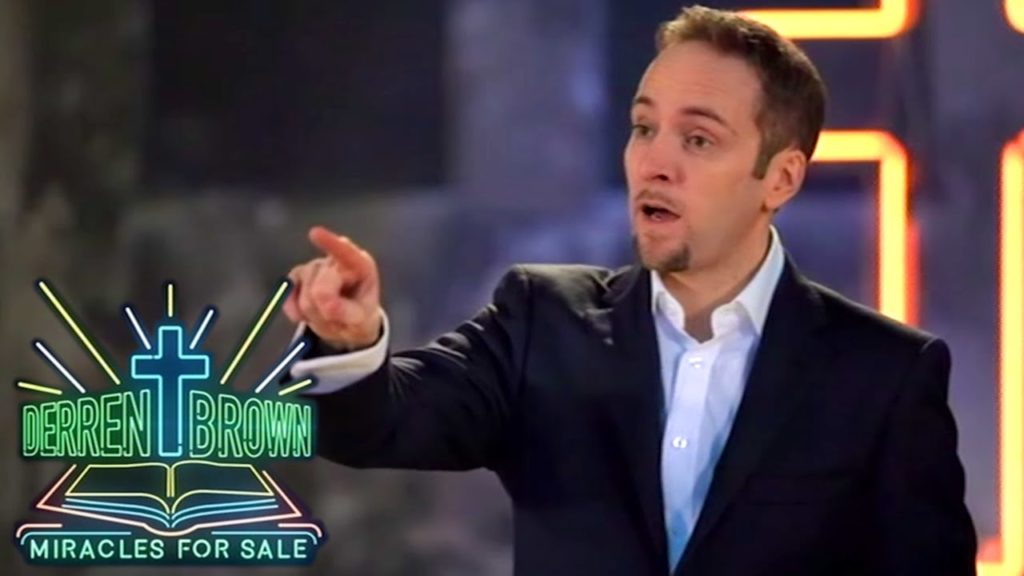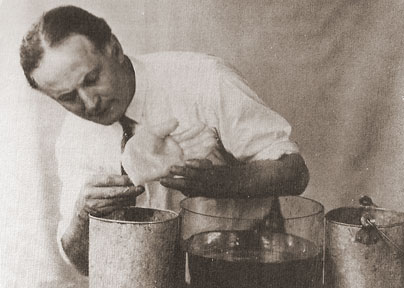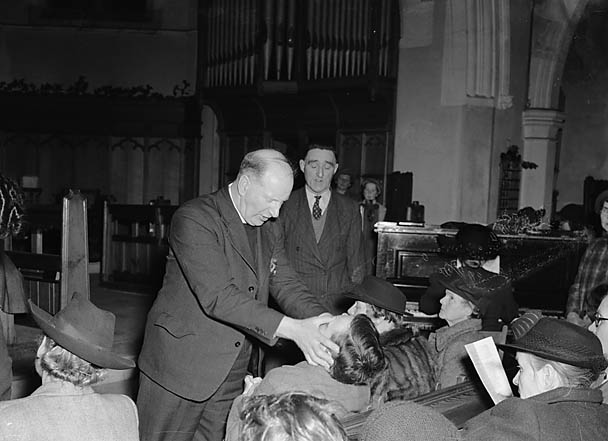Last night I went to a faith healing – the lame walked again, the half-blind cast their glasses aside and read with ease, and decades-old medical complaints vanished, leaving their sufferers blissfully free of pain for the first time in years. People spoke in tongues, demons were cast out, and God was invoked, along with repeated requests for donations to continue the Lord’s good work.
The catch? The man invoking the power of God to heal the sick was an atheist proving a point – that faith healing is a scam, cashing in on people’s fear in order to make money. This wasn’t a real faith healing but the climactic finale to Miracle, the latest stage show from British mentalist Derren Brown.
Brown is no stranger to controversy – his 2003 TV special Russian Roulette involved him putting a loaded gun to his head, and in his 2004 show Seance, he claimed to be contacting the dead, and generated over 600 complaints in the UK.
In recent years Brown has consistently encouraged his audience to think in a critical, skeptical manner. Miracle is the latest in a long line of shows seemingly designed to teach the audience a lesson: to beware charlatans and to think for themselves. Infamous, his 2013 stage show, looked to expose the fraudulent methods psychics claim allow them to contact the dead. This year’s TV special Pushed To The Edge looked at how blindly following orders can get us into trouble; and in addition to Miracle, his 2011 special Miracles for Saleshowed him training an ordinary member of the public the skills needed to fake it as a faith healer.

Surely, though, it is in a magician’s best interest to keep his audience suggestible, gullible, and open to belief in extraordinary powers? After all, magicians thrive on our credulity. The less skeptical we are when presented with a trick, the easier we are to fool, which is perhaps why some magicians incorporate extraordinary claims into their personas, such as Israeli spoon-bender Uri Geller’s claim he is psychic. That approach claims there’s no need to be vigilant; just relax, it’s literally magic.
But there is also a strong tradition of magicians showing how magic really works. In the 1990s TV show Breaking the Magician’s Code: Magic’s Biggest Secrets Finally Revealed, a masked magician broke magic’s big taboo, showing us how tricks were really performed. Penn and Teller’s Fool Us invites magicians to perform a trick the experts can’t explain, winning the chance to perform in Las Vegas if they can. But these shows are entertainment. We now accept that a magician is a glorified con artist, albeit one who cheerfully acknowledges that what they are doing is a lie (after all, there is a reason why we call them “tricks”). But some magicians also take their stripping of illusion out into the real world, showing how the same techniques they use to bamboozle their audiences can be used by those with darker motives.
One magician who did so was the late, great Harry Houdini who, back in the 1920s, turned against spiritualism, sometimes attending séances in disguise and unpicking the methods of some of the top mediums of the day, and notoriously referring to spiritualists and psychic mediums as, “vultures who prey on the bereaved.”

What Brown does differently to Houdini and other modern, skeptical magicians is that he practically demonstrates the techniques of those he believes to be charlatans. Séance showed Brown acting in the same way a spirit medium would, guiding his participants through a séance only to show at the end how all the supposedly paranormal phenomena were faked. Infamous took this idea to the next level. Brown appropriates the language and mannerisms of modern-day spiritualists and performs “reading” after “reading,” showing the kind of intimate knowledge that psychic mediums attribute to the dead. The point is simple: if Brown can fake the supernatural using techniques such as auto-hypnosis and cold reading, perhaps others are doing it too, and just not telling us.
Miracle, too, has Brown appropriating the language and techniques of his target, in this case faith healing. As well as performing the “healing,” after directly saying that he has no faith and that it is all a con, he talks in the manner of the big preachers, praising the Lord and exhorting his audience to donate money (without, I hasten to add, actually taking anything from them). This section of the show is pure satire, with Brown confidently adopting a persona in order to ridicule it.
Faith healing requires that those wishing to be healed throw off their reliance on prescription medication; that they must stop taking their pills and treatments and trust entirely to God for healing. For the practitioner, this is a win-win; if they get better then, you have a miracle that science can’t claim for its own, and if they don’t, you can blame the afflicted for their perceived lack of faith. For those desperate enough to take part this is incredibly dangerous, and could cost them their lives. In Miracle, Brown is at pains to state that what he has achieved is temporary and that no one should stop taking anything, acknowledging that the effect he has created will not last, as is usually the case with faith healing, which often ends in tragic circumstances.
Pushed to the Edge, shown on UK TV this year, continues another of Brown’s recurring themes: thinking for yourself. On the show, an unwitting participant is pushed and prodded into making a series of horrible decisions when a guest at a charity dinner “dies.” This leads them to a moment of choice: do they push someone off the roof to save the charity and allow it to continue helping the kids that depend on it, or do they let that person walk away and potentially face a prison sentence as a result of what they’ve already done? Throughout the show the charity’s head, the participant’s boss, is constantly encouraging them to do bad things “for the sake of the children,” and in this it reminds me of Milgram’s obedience experiments of the 1960s.
Over the last decade Brown has consistently taken on Spiritualism, faith healing, psychics, and blind obedience. What, then, motivates him to take on these practices and the communities that exist around them? In 2005, Brown said, “I don’t have any urge to change anyone’s beliefs, though I do think that if people are making life-decisions based on what might be false information, then it’s probably worth them having the knowledge to hand to make informed decisions. I do think that an understanding of non-paranormal explanations and the mechanics of out-and-out fraud is useful information.”
By 2011, however, he had changed his tune, saying of psychics, mediums, and faith healers, “I realized they’re genuinely dangerous.” This was around the time he began to tackle these subjects more aggressively, not just in the documentaries he filmed for the UK’s Channel 4, but also in his magic shows. Brown is on a crusade.

Some might call this ironic – Brown stands onstage and says that no one has a right to trample on your memories of the dead by pretending to contact them, and then appears to do exactly that when he adopts the persona of a medium. He tells us that faith healing is fake and exists only to separate us from our money during a theatrical show with tickets costing upwards £50 each. He teaches us not to blindly follow orders by applying great pressure on people to do exactly that. But, in his own words, Brown is “Honest about my dishonesty” and doesn’t claim any special powers. He isn’t encouraging anyone to pay out for his shows out of a desperate hope that they can have one final moment with a lost relative, and he isn’t encouraging anyone to do anything that might actually cause harm. Instead, people go to his shows to be entertained and perhaps, as his shows have developed, learn something.
This approach is what keeps me coming back to Derren Brown, even as my interest in other magicians has faded; yes, magic is interesting, but there’s only so many times you can be fooled for the sake of it. Magic sometimes feels like the revenge of the nerd (and I’m not knocking that, as a nerd myself) – look what I did, it says, I got you, I’m cleverer than you, I win. By giving a point to what could otherwise just be intellectual posturing, he has revitalized magic, giving it a point and relevance beyond mere spectacle.
We need people like Derren Brown, who are not only able to stand up and say, “This is a lie,” but to then show us how the lie is achieved. We need more people encouraging us to think and act for ourselves, to distrust authority, and not follow blindly where others lead. In an age where mega-rich men of God live in mansions while kids die of hunger and the sick can’t access healthcare, where political rhetoric is increasingly divisive and dangerous, where minorities are dehumanized online and treated as targets, where governments feel they can break their own laws, spy on their own citizens and detain people indefinitely without charge, we could all do with maintaining a clear, skeptical head. No matter what people say about his stage persona, his shows have the potential to change the way people think. That is a positive intent behind his shows that is no illusion.